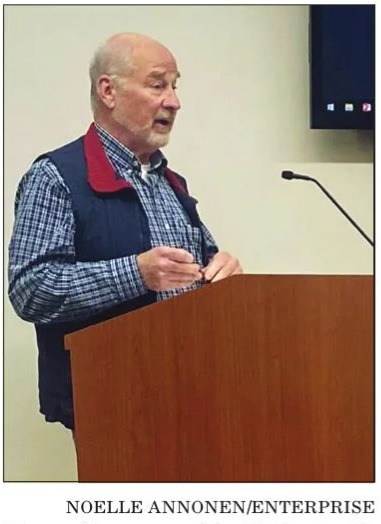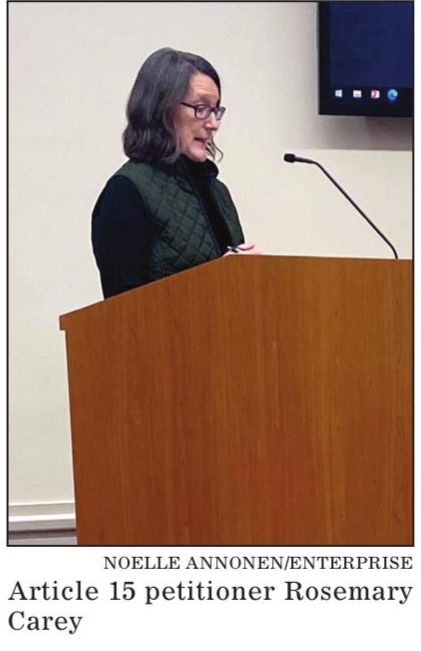On Monday, 2/27/23, the Select Board upheld their decision of December 19, 2022 by voting 4-1 to recommend that ARTICLE 15 of the April Town Meeting be “indefinitely postponed”. However, ARTICLE 15 will remain on the Town Meeting warrant to be discussed by Town Meeting Members.
From the Falmouth Enterprise, Tuesday Early Edition on 2/28/23 by Noelle Allonon:
“Falmouth Select Board Doubles Down On Wind Developer Denial”
Falmouth Select Board on Monday night, February 27, doubled down on its earlier vote to deny offshore wind developers access to town property.
Board members said SouthCoast Wind lacks transparency and has not worked well with the town. But board members stressed they are not taking an official stance on SouthCoast Wind’s overall proposal to bring its electricity ashore in Falmouth.
In December, the select board voted to deny the company access to public lands in Falmouth Heights for further soil testing and engineering studies. In response, Falmouth resident Rosemary Carey and others submitted a petition article for the April Town Meeting warrant, Article 15, which would reverse that decision.
At its meeting Monday, the board—by the same 4-1 vote—held firm and declined to support Article 15, despite Ms. Carey’s plea they reconsider.
Both proponents and opponents of the article filled the select board meeting room. Falmouth Heights and Maravista Neighborhood Association president David Buzanoski (photo above) said Article 15 is “divisive” and seeks to subvert a board of elected representatives. Mr. Buzanoski said the language of the article—which does not name SouthCoast Wind—is too broad and would allow any company to conduct tests without going through town government or establish a good relationship with the public.
Falmouth Heights and Maravista Neighborhood Association president David Buzanoski (photo above) said Article 15 is “divisive” and seeks to subvert a board of elected representatives. Mr. Buzanoski said the language of the article—which does not name SouthCoast Wind—is too broad and would allow any company to conduct tests without going through town government or establish a good relationship with the public.
Samuel H. Patterson was the sole select board member to vote, in December, in favor of allowing SouthCoast Wind (then called Mayflower Wind) to continue with cable feasibility testing. Mr. Patterson said “we” should consider future generations that will be impacted by climate change. Mr. Buzanoski said the “we” is unfairly heaved onto Falmouth Heights.
“We are being asked, if not ordered by others, to bear the burden of Falmouth’s part,” Mr. Buzanoski said. “Who is caring and looking after Falmouth Heights?” Ms. Carey said she and the other article sponsors are advocates for renewable energy and are only asking that the developer be allowed to collect more data, which will help the town make an informed decision on the project later on.
Ms. Carey said she and the other article sponsors are advocates for renewable energy and are only asking that the developer be allowed to collect more data, which will help the town make an informed decision on the project later on.
“We are residents of this town,” she said. “And we want our voices heard.”
She said the town can benefit financially from a host agreement with SouthCoast. She said the company demonstrated a desire to communicate better with the town by providing answers to questions asked by the Enterprise and the town last week.
“We can’t allow offshore wind development to be stopped in its tracks without understanding the complete picture,” Ms. Carey said.
Other proponents stressed the need for renewable energy in a global climate crisis. “If we don’t take advantage of these kinds of projects, our Mother Earth is doomed…to lose our species and many other species,” Sandra Faiman-Silva. said.
Opponents said SouthCoast Wind was acting in bad faith without regard for the town, citing numerous unanswered questions and the company’s filing of a waiver to be exempted from local zoning bylaws. Some said they support renewable energy but that a residential, vacation community is not the right place for the cable to come ashore.
“Falmouth residents are the priority here,” Greg Mazmanian said. “Not the shareholders of SouthCoast.”
Vice Chairwoman Onjalé Scott Price said when she voted against SouthCoast Wind in December, she hoped she was holding them accountable to answering questions and communicating with the town. People have told her she is not thinking about the future, but she is, she said.
The vote put the onus on South Coast Wind to come back and work cooperatively with the town, she said, and the answers the town received last week might be a sign of that. But she said SouthCoast Wind is owned in part by Shell Oil, a company that “got us into this mess.”
Chairwoman Nancy R. Taylor agreed.
“I don’t think this [article] is in the best interest of the town,” she said. “I don’t think there is anyone on this board that isn’t interested in alternative energy and making it work. But [developers] have to work with us.”
Member Edwin (Scott) P. Zylinski II said the town must stand with and have compassion for communities nearest the cable landfall and corridor sites. “They haven’t showed me enough,” Mr. Zylinski said. “There are other options. I want to see them.”
Member Douglas C. Brown said the answers to the town’s questions only further proved to him that South Coast is operating in bad faith. He said that if the company had told him upfront that it only ever planned on connecting through Falmouth Heights, he would have opposed granting them even initial access to town property.
Member Samuel H. Patterson reiterated the need for a project like SouthCoast Wind but conceded he feels the company did not “put forward their brightest,” as its timeline and plans have morphed. He stressed that Falmouth would benefit from the project’s renewable energy, as fossil fuels prices will only continue to increase.
“It’s not that we don’t support the science…[and] renewable energy,” Ms. Scott Price said. “It is about this company and the lack of working with the town.”
The board then voted against recommending Article 15. Mr. Patterson was again the only dissenting vote. The board’s vote is advisory. Town Meeting will ultimately vote to approve the article or not.
SouthCoast Wind has applied for numerous exemptions to Falmouth’s local zoning bylaws with the Massachusetts Department of Public Utilities. However, the company says it needs the town’s approval to move forward because of Article 97 of the state constitution, which relates to local control over public lands.
Because SouthCoast’s current plans require an easement over public lands in Falmouth Heights, Falmouth’s town counsel has written that “if a proposed article to grant an easement over Town land fails to pass at Town Meeting, for example, there is no action the EFSB [the state Energy Facilities Siting Board] may take to override that vote.”
